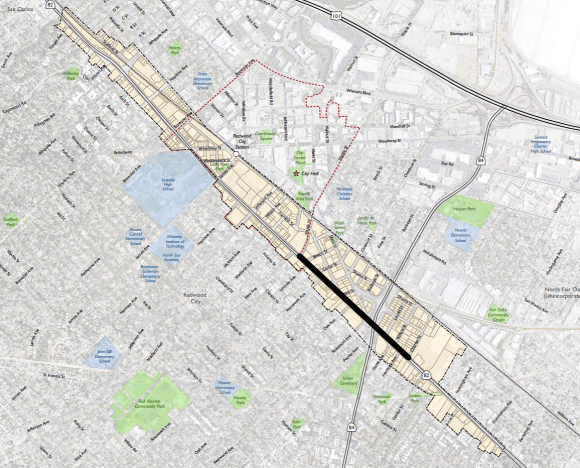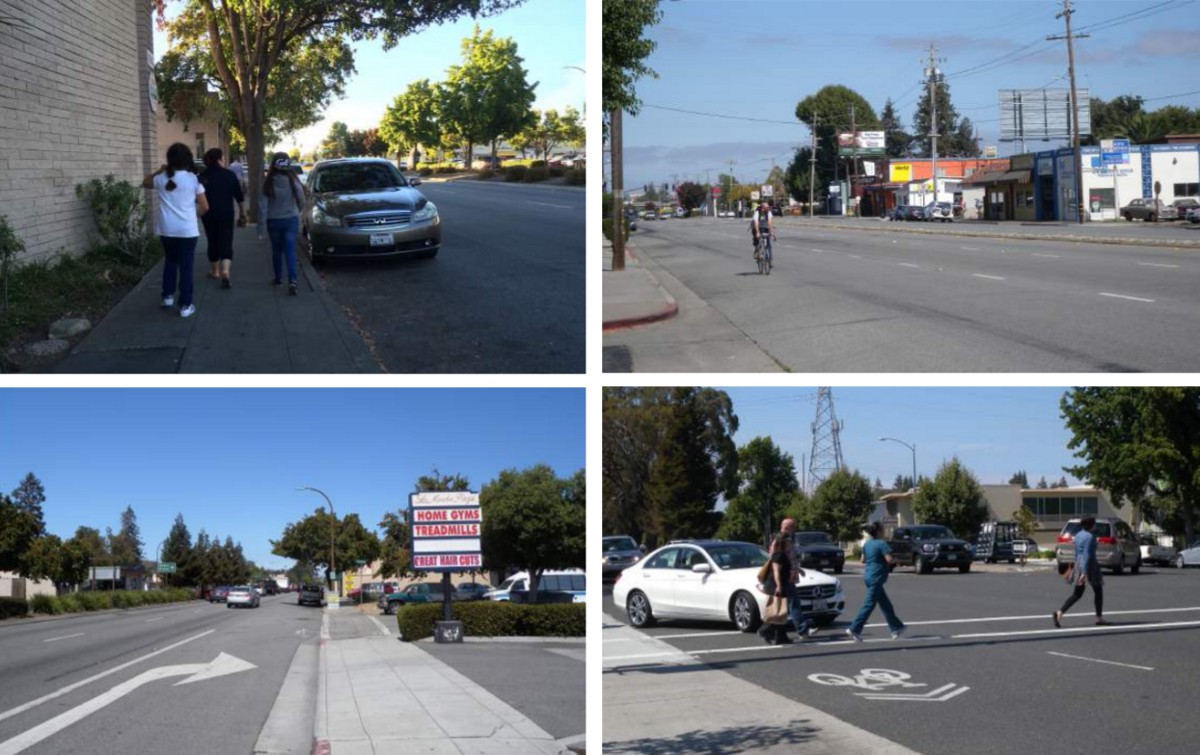Redwood City hosted the first of two scheduled community meetings on its El Camino Real Corridor Plan last month, aiming to lay the groundwork for redeveloping commercial parcels along the roadway and transform it into a Complete Street. After this study is finished sometime next year, a separate study funded by a grant from Caltrans will pay for a new design to rebuild a one half-mile segment of the street that spans the Woodside Road interchange.
“It’s ultimately going to consist of a set of roadway and streetscape improvements, which improve mobility, safety, and aesthetics,” said Project Manager Sophie Martin of consulting firm Dyett & Bhatia, at the November 16 meeting.
Hundreds of pages of analysis by the city’s consulting team on land use and urban design, transportation and parking, and a real estate market analysis were finished by the consulting team in October and November. The analysis includes bicycle and pedestrian traffic volumes, as well as detailed inventories of the street's sidewalks and crosswalks.
“It’s very auto-oriented right now but that doesn’t mean people don’t walk on it, take transit on it, and occasionally bike on it, but conditions for those uses are... not that great,” noted Martin in a rather massive understatement.
A separate $350,000 grant, awarded by Caltrans in June, will provide a new design for El Camino Real from Main Street to Charter Street, the city most hazardous and impassible segment for people walking and bicycling due to the interchange with Woodside Road. This design work will proceed in 2018 after the current Corridor Plan is completed. The grant also includes funds to redesign El Camino Real between Cambridge and Lambert avenues in central Palo Alto.

The most likely safety upgrades are those already included in previous Grand Boulevard Initiative Complete Streets re-designs: wider sidewalks, curb extensions, high-visibility crosswalks, pedestrian refuges in medians, and street trees planted in both the medians and sidewalks. Crossing El Camino Real on foot to reach the Redwood City Caltrain Station is a “hot spot” of high pedestrian traffic and collisions that city staff say they want to pay particular attention to.
But like those other El Camino Real “Complete Streets” designs, most notably in South San Francisco, planners aren’t yet convinced that hazards faced by bicyclists need to be fixed at all.
“How could we provide for a safer and more continuous path for cyclists on El Camino, and if we did do that, what do we give up in exchange?” Martin asked the audience of about twenty residents at November's community meeting. ”If you really don’t think that El Camino is the right place for bicycles, then where could we try to provide an alternate route that’s parallel to it, that’s pretty close by?”
The consulting team also suggested excluding bicycle improvements in their existing conditions summary report [PDF]: “Trade-offs are inherent. Another consideration is whether an alternate, equally attractive bicycle route, that roughly parallels El Camino Real, could be provided.”
Yes, alternate routes for bicycling certainly can be provided, but such a “separate but equal” doctrine violates the very definition of El Camino Real as a Complete Street - one that is safe for people of all ages and abilities to use all modes of transportation. And yes, that includes bicycling.
Fortunately, city staff are entertaining the idea of replacing on-street parallel parking spaces with separated bike lanes, as the Menlo Park City Council tentatively approved last year for that city's segment of El Camino Real but then postponed in May. Planners call the parking “somewhat underutilized,” noting that on average during mid-day on a weekday, 65 to 70 percent of the 266 on-street parallel parking spaces on El Camino Real within Redwood City were occupied. The number of parking spaces available in off-street parking lots and garages near the street were not counted.
Visit the city's project webpage for more information on the El Camino Corridor Plan. To provide feedback to city planners, contact Redwood City Senior Plan Lindy Chan (650-780-7237, lchan@redwoodcity.org) or Dyett & Bhatia Project Manager Sophie Martin (415-956-4300, sophie@dyettandbhatia.com).






